
African Journal of Emergency Medicine
Scope & Guideline
Empowering Healthcare Professionals with Open Access Research
Introduction
Aims and Scopes
- Emergency Care Practices:
The journal focuses on the practices and protocols involved in emergency care, including triage, pain management, and the use of emergency medical services. It emphasizes the importance of adapting these practices to local contexts and resources. - Public Health and Emergency Medicine Integration:
Research published in the journal often explores the intersection of public health and emergency medicine, highlighting the role of emergency services in addressing public health emergencies, disease outbreaks, and health system preparedness. - Training and Education in Emergency Medicine:
A significant area of focus is on the education and training of emergency medicine professionals, including curriculum development, competency assessments, and the evaluation of training programs to improve emergency care delivery. - Innovative Solutions and Technology:
The journal encourages the exploration of innovative technologies and solutions, such as telemedicine, point-of-care diagnostics, and mobile health applications, aimed at improving emergency care in resource-limited settings. - Trauma and Injury Management:
A core area of research includes the epidemiology and management of trauma and injuries, addressing the burden of road traffic accidents, violence, and other significant contributors to emergency presentations.
Trending and Emerging
- Impact of COVID-19 on Emergency Services:
There is a growing body of research examining the effects of the COVID-19 pandemic on emergency services, including changes in patient presentations, healthcare provider experiences, and adaptations in emergency care protocols. - Mental Health in Emergency Medicine:
Recent publications increasingly address the mental health aspects of emergency care, including the management of suicidal behaviors and the psychological impacts of trauma, indicating a recognition of the importance of mental health in emergency settings. - Community-Based Emergency Care Models:
Emerging research highlights community-based approaches to emergency care, emphasizing the role of community health workers and local initiatives in improving access to emergency services, particularly in rural and underserved areas. - Sustainable Emergency Medical Services:
There is a trend towards exploring sustainable practices in emergency medical services, including resource allocation, training of non-specialists, and the integration of emergency care within broader health systems, reflecting a commitment to long-term improvements. - Use of Technology in Emergency Medicine:
The integration of technology, such as telehealth and mobile applications for emergency care, is increasingly featured, highlighting innovative solutions to enhance access and efficiency in emergency medical services.
Declining or Waning
- Traditional Emergency Medicine Practices:
There is a noticeable decline in studies focusing solely on traditional emergency medicine practices without the integration of public health perspectives or technological advancements. This may indicate a shift towards more holistic approaches in emergency care. - Generalized Emergency Care Assessments:
Research that provides generalized assessments of emergency care without specific contextual applications or innovations has decreased, suggesting a trend towards more localized and targeted studies that address specific challenges faced by different regions. - Non-urgent Care in Emergency Settings:
Papers addressing non-urgent care presentations in emergency departments are less frequent, possibly reflecting a growing recognition of the need for better triage and management systems to direct non-urgent cases to appropriate care settings.
Similar Journals
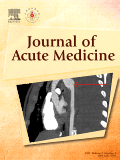
Journal of Acute Medicine
Connecting professionals with cutting-edge acute medicine insights.Journal of Acute Medicine is a pivotal platform for disseminating cutting-edge research within the fields of Critical Care and Intensive Care Medicine and Emergency Medicine. Published by the Taiwan Society of Emergency Medicine in the Netherlands, this journal serves as a vital resource for healthcare professionals and researchers devoted to advancing acute medical practice. With an ISSN of 2211-5587 and an E-ISSN of 2211-5595, the journal features a collection of high-quality articles that focus on the latest developments and challenges facing emergency healthcare systems. Since its inception in 2011, the journal has achieved a respectable Q3 ranking in both critical care and emergency medicine categories, demonstrating its commitment to scholarly excellence. Although it currently does not operate as an open-access publication, the journal provides a critical forum for exchanging knowledge, fostering collaborations, and enhancing clinical practices, ensuring that it remains an essential read for those involved in acute medical care.
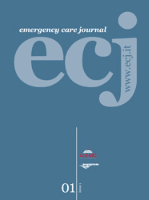
Emergency Care Journal
Empowering Clinicians through Open Access KnowledgeThe Emergency Care Journal is a vital open-access publication dedicated to the field of emergency medical services and nursing, published by PAGEPRESS PUBL. Since its inception in 2005, the journal has aimed to provide a platform for researchers, clinicians, and scholars to share knowledge and advance practices in the critical domain of emergency care. With an ISSN of 1826-9826 and an E-ISSN of 2282-2054, the journal is committed to enhancing accessibility and reaching a global audience. Although its Scopus rankings reflect a competitive landscape, particularly in the ranks of Health Professions and Emergency Medicine, the journal continues to serve as an essential resource for emerging studies and professional insights. Nestled in Italy, the journal seeks to bridge the gap between academic research and real-world application, ultimately improving patient care and outcomes in emergency settings. As it converges into the years 2023 and 2024, Emergency Care Journal stands poised to foster scholarly discussions and innovative research that are crucial to the evolving landscape of emergency medicine.

Open Access Emergency Medicine
Fostering innovation in emergency medicine and nursing.Open Access Emergency Medicine, published by DOVE MEDICAL PRESS LTD, is a premier journal dedicated to the dynamic fields of Emergency Medicine and Emergency Nursing. With its ISSN 1179-1500, this journal has established a notable presence since its inception as an Open Access platform in 2010, offering unrestricted access to high-quality research and innovative practices in the area. As one of the leading journals in its field, it holds a respectable Q2 ranking in both Emergency Medicine and Emergency Nursing categories as of 2023, reflecting its commitment to advancing knowledge and fostering impactful research. The journal is indexed in prestigious databases with solid Scopus rankings, placing it in the 65th percentile for Emergency Medicine and the 64th percentile for Emergency Nursing, ensuring that contributions reach a diverse audience of researchers, practitioners, and students worldwide. With its focus on contemporary issues, this journal serves as an essential resource for the continual growth and development of emergency health services.
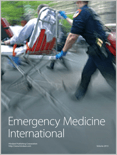
Emergency Medicine International
Advancing emergency care through cutting-edge research.Emergency Medicine International is a distinguished journal dedicated to the dynamic field of emergency medicine, published by HINDAWI LTD. As an Open Access journal since 2010, it ensures widespread dissemination of high-quality research, providing vital insights and advancements in emergency care and crisis intervention methodologies. With an ISSN of 2090-2840 and an E-ISSN of 2090-2859, the journal is indexed in Scopus, where it holds a commendable rank of #104 of 109 in the emergency medicine category, placing it in the 5th percentile. Spanning crucial years from 2014 to 2017 and 2022 to 2024, Emergency Medicine International has established a reputation for publishing significant findings that aid practitioners and researchers in improving emergency healthcare outcomes. Operating from its headquarters in Egypt, the journal serves as an essential resource for professionals and students alike, fostering the development of evidence-based practice in a critical area of healthcare.

Australasian Emergency Care
Pioneering the Future of Emergency Nursing.Australasian Emergency Care, published by ELSEVIER SCI LTD, stands out as a premier journal in the field of Emergency Nursing, currently holding a prestigious Q1 ranking and positioned in the top 85th percentile according to Scopus metrics. With an E-ISSN of 2588-994X, this journal has been a vital platform for disseminating cutting-edge research since its inception in 2018. Focused on enhancing the practice, education, and research surrounding emergency nursing, Australasian Emergency Care serves as an essential resource for clinicians, educators, and researchers, offering access to a wide array of high-quality peer-reviewed articles. The importance of this journal lies in its commitment to improving patient outcomes through evidence-based practices and innovations in emergency care, making it a pivotal resource for anyone dedicated to advancing their knowledge and expertise in this critical field.
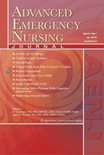
Advanced Emergency Nursing Journal
Shaping the Future of Emergency Medicine TogetherAdvanced Emergency Nursing Journal, published by Lippincott Williams & Wilkins, stands as a key resource within the domains of Emergency Medicine and Emergency Nursing. With a commitment to advancing the field, this journal provides a platform for rigorous research, critical reviews, and innovative practices aimed at enhancing patient care in emergency settings. Though it holds a Q3 ranking in both related categories as per the 2023 metrics, its global reach spans various aspects of emergency care, promising insights that are crucial for both professionals and academics alike. Covering topics from clinical procedures to policy analysis, the journal invites submissions that aim to bridge theory and practice, highlighting the importance of evidence-based approaches in emergency nursing. Researchers, educators, and healthcare practitioners can Find more information and explore their own contributions in a dynamic environment that continuously evolves with the field. Whether you're seeking to stay current with the latest advancements or to publish your findings, this journal is an essential asset for those dedicated to improving care in urgent medical situations.
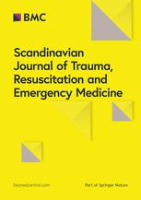
Scandinavian Journal of Trauma Resuscitation & Emergency Medicine
Shaping the Future of Resuscitation and Emergency MedicineThe Scandinavian Journal of Trauma Resuscitation & Emergency Medicine, published by BMC, stands as a leading open-access platform dedicated to advancing the fields of trauma, resuscitation, and emergency medicine since its inception in 2008. With an ISSN of 1757-7241 and an impressive track record, this journal has established itself in the top quartile of critical care and emergency medicine, achieving Q1 rankings in both categories for 2023. Its Scopus rankings further underscore its importance, placing it among the top 11 journals in emergency medicine and the 23rd in critical care and intensive care medicine, signaling a strong impact within the academic community. As we converge toward 2024, the journal continues to provide researchers, clinicians, and students with valuable access to cutting-edge research and developments in the sector, contributing significantly to knowledge, practice, and policy in emergency care. Located in the heart of the United Kingdom, the journal remains dedicated to its mission of fostering innovation and dissemination of high-quality research, ensuring that vital medical advancements reach those who need them most.
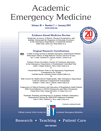
ACADEMIC EMERGENCY MEDICINE
Shaping the Future of Emergency Medicine ResearchACADEMIC EMERGENCY MEDICINE, published by Wiley, stands as a leading journal in the field of emergency medicine, distinguished by its impressive rankings, including Q1 categories in both Emergency Medicine and Miscellaneous Medicine. With an ISSN of 1069-6563 and an E-ISSN of 1553-2712, the journal covers a broad array of topics relevant to emergency medicine, advancing research from its inception in 1994 up to 2024. Ranked #8 out of 109 in its category, this journal sits in the 93rd percentile according to Scopus, underscoring its significance and influence within the academic community. Although it does not currently offer open access options, its rigorous peer-review process and comprehensive publication standards ensure that only the highest quality research reaches its readership. Aimed primarily at researchers, practitioners, and students in the field, ACADEMIC EMERGENCY MEDICINE serves as an essential resource for those seeking to enhance their understanding and practice of emergency care, making significant contributions to both theory and clinical applications in the field.

International Journal of Emergency Medicine
Advancing global knowledge in emergency medicine.The International Journal of Emergency Medicine, published by BMC since 2009, stands at the forefront of research in the field of emergency medicine. With an outstanding impact factor and recognized as a Q1 journal in the 2023 category of Emergency Medicine, it holds a prominent Scopus Rank of #18 out of 109, placing it in the 83rd percentile for quality research. This open access journal, based in the United Kingdom, is dedicated to disseminating high-impact studies to a global audience, allowing professionals, researchers, and students to access innovative findings without barriers. The journal's objectives are to advance the field through comprehensive articles, rapid communications, and critical reviews that address the most pressing challenges faced in emergency care. By fostering collaboration among experts in the field, International Journal of Emergency Medicine is essential for anyone committed to improving practices and outcomes in emergency medicine from 2009 through to 2024.

Current Emergency and Hospital Medicine Reports
Transforming Emergency Medicine with Evidence-Based KnowledgeCurrent Emergency and Hospital Medicine Reports, published by Springer, is a pivotal journal in the field of emergency and hospital medicine. With a commitment to disseminating crucial research and advancements, this journal serves as a platform for sharing high-quality studies that enhance clinical practices and improve patient outcomes. As an important resource for researchers, healthcare professionals, and students, it caters to the growing need for evidence-based knowledge in emergency medicine. Although currently not classified as open access, the journal offers a wealth of information that aligns with the latest innovations and practices in the discipline. By engaging with diverse topics, from clinical interventions to hospital management strategies, it aims to inform and inspire the next generation of practitioners and scholars in this vital field of medicine. With its ISSN of 2167-4884, Current Emergency and Hospital Medicine Reports is dedicated to advancing the frontiers of emergency healthcare through rigorous research and illuminating insights.